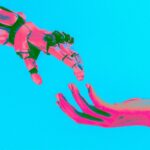I was scrolling the other day—harmless, idle browsing. The kind of scroll I do when I have some time to myself, and I’m not looking for anything in particular. And hopefully, I’ve finished some chores. But something strange happened. I stopped, not because of the content, but because I realized I was no longer sure why I was seeing what I was seeing. Or more to the point: who was showing it to me.
An AI had decided it was good for me.
That moment—a bit of mild digital vertigo—got me thinking. Algorithms increasingly determine what we see, what we hear, what we read, even what we believe. And as the line between human reasoning and machine prediction blurs, the Catholic in me bristles. Because there’s something deeper at stake than just screen time or ad revenue.
There’s the soul. There’s free will. There’s truth.
And those don’t belong to the algorithm or the “doom scroll.”
The Machine Will See You Now
We’ve crossed a threshold. Not only are our digital lives shaped by algorithms—we’re now beginning to outsource decisions, moral discernment, even emotional labor to machines. Artificial intelligence recommends everything from the next movie to the next romantic match to the next job. More disturbing applications can simulate human thought, write essays, imitate voices, generate fake people, and synthesize your behavior to predict your next move before you even make it. But on the surface for most people, AI makes a lot more decisions for us than we realize.
What’s presented as “neutral” technology is in fact deeply value-laden. Behind every algorithm is a set of assumptions—about what is desirable, efficient, engaging, profitable, or good. And none of these assumptions are revealed. They’re buried under a clean interface and a logo with a smile.
The Church has something to say about this. Pope Francis, in Laudato Si and more recently in Laudate Deum, warns about “technocratic paradigms” that view creation—and, by extension, human beings—as objects to be managed. He calls for an integral ecology that respects the dignity of the human person, body and soul, in the face of systems that reduce us to data points.
The Catechism reminds us that “man is rational and therefore like God; he is created with free will and is master over his acts” (CCC 1730). When machines begin to anticipate our desires better than we do, and when we uncritically follow their lead, that mastery is quietly eroded.
We may still be clicking, or scrolling, or swiping, but someone else is holding the lantern.
Not Just a Tool
It’s tempting to brush this off. “It’s just a tool,” people say. “It depends how you use it.”
There’s plenty of truth in that—but not all of it. A hammer is a tool. A telescope is a tool. A calculator is a tool. But an algorithm, especially a learning one, is something different. It doesn’t just serve your will—too often, it shapes that will. It doesn’t just help you reach a conclusion—it guides you to one, and if it’s well-calculated (or calculated enough) you’ll accept.
That’s why this matters. It’s not about fear-mongering. It’s about formation.
The human soul is not a stasis thing: it is formed by habit, reflection, silence, prayer, suffering, study, conversation, grace. The algorithm bypasses almost all of these. It replaces the slow grind of formation with the dopamine hit of confirmation. It studies you so it can show you more of what you already like—and less of what challenges you. The result? You’re catechized by your preferences. Evangelized by your appetites.
And we wonder why so few people are capable of serious moral thought anymore.
What Is Truth?
Pilate’s question echoes louder than ever: Quid est veritas? What is truth? For the world, truth has become a shifting, digital landscape—shaped by trends, tweaked by filters, adjusted to suit a consumer’s comfort. For the Christian, truth is a person: Christ, the Logos made flesh, unchanging and eternal.
That’s a hard sell in an age of curated realities. But it’s exactly why the Church has something essential to offer.
Catholicism is not anti-technology. But I feel confident saying that it is anti-reduction. It refuses to reduce the human person to a sum of behaviors. It refuses to reduce morality to the efficient. And it refuses to reduce truth to whatever happens to be trending.
The Church says: you are more than your browser history. You are not a consumer profile. You are not your data. You are a soul made in the image of God, capable of choosing the good, the true, the beautiful—even when it costs you.
AI may predict your behavior. It may mimic your speech. It may predict your needs and interests. But it cannot pray. It cannot repent. It cannot love with a free and self-sacrificing heart. And it cannot know God.
Only you can do that.
Discipleship in the Digital Age
So what does discernment look like in a world ruled by algorithms? Here are three habits I think we need to cultivate as Catholics—urgently.
1. Radical Interior Silence.
Put down the phone. Not just occasionally. Build real silence into your day. Listen to your thoughts. Let God speak. If our inner life is filled with notifications, we’ll never hear the quiet voice that says, “This is the way; walk in it.”
2. Know the Voice of the Shepherd.
The more you know Christ—through Scripture, the sacraments, spiritual reading—the easier it is to spot the counterfeit. An algorithm can flatter you, enrage you, distract you, but it cannot love you unto death. The Shepherd does.
3. Choose Things That Don’t Choose You Back.
The internet is built to come to you. But sacraments don’t auto-play. The Rosary doesn’t “recommend itself.” The Mass doesn’t follow you around. You have to go toward them. Choose the slow, incarnate, grace-filled things.
The Final Judgment Isn’t Automated
One day we will stand before God—not as data, not as input/output, not as sentiment analysis, but as persons. Not one click, not one scroll, not one “smart” decision will stand in for the human heart. It will be judged not by prediction, but by love.
And no machine can love in your place.
Photo by Cash Macanaya on Unsplash




















